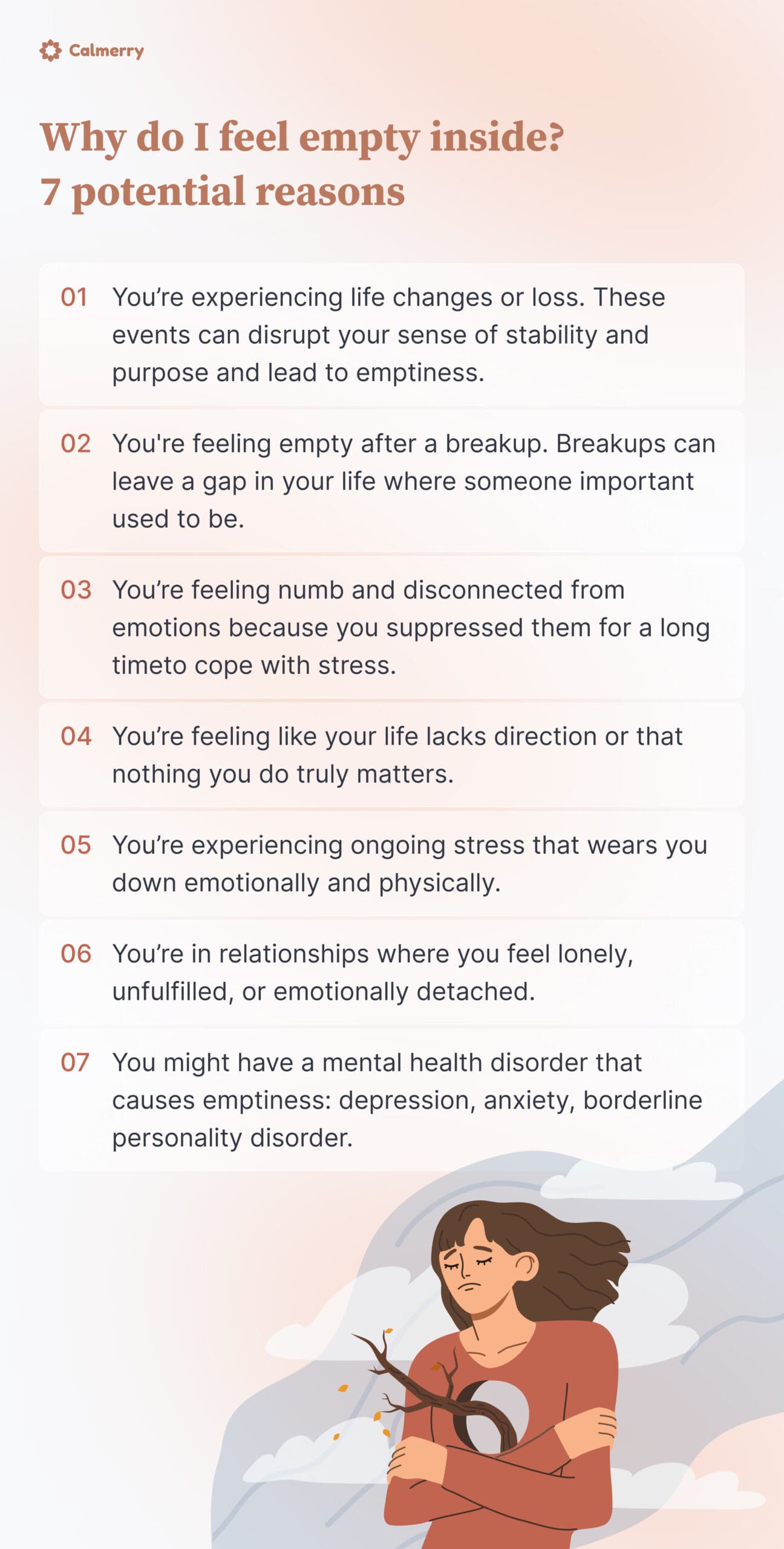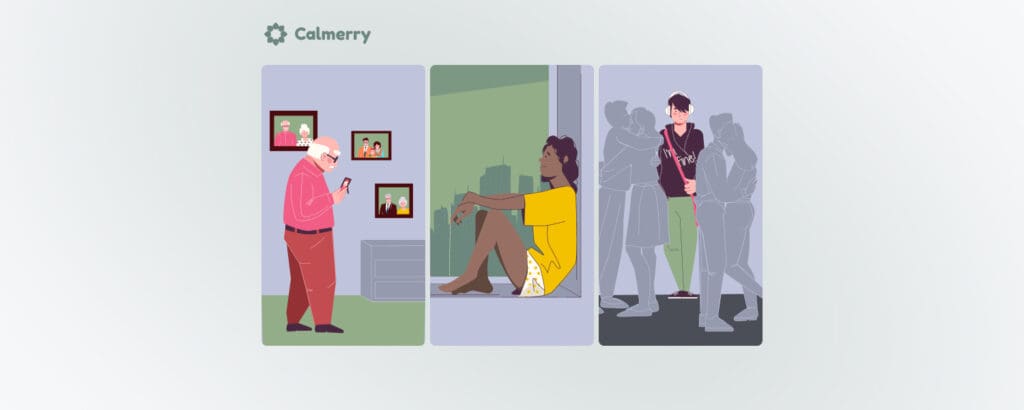Why Do I Feel Empty? Is It Normal?

In this article
Have you ever felt a vast hollowness inside, a sense that something important is missing or that you can’t quite find the feelings you’re “supposed” to feel?
This feeling of emptiness is a common human experience. It’s that unsettling feeling that there’s a void within you, a lack of fulfillment or purpose. It can be like going through the motions of life without feeling truly engaged or connected.
This article explores the reasons behind this sense of emptiness. It offers practical strategies to help cope with and address these feelings.
Whether you’re dealing with a recent loss, a significant life change, or ongoing mental health challenges, knowing the answer to the “Why I feel so numb?” is the first step toward finding ways to fill that void.
What does it mean – to feel empty?
Feeling empty is an experience where someone senses a profound lack of fulfillment or meaning in their life. It’s not just about feeling sad or down – it’s a more profound sense of inner void.
This feeling can make everyday activities seem pointless and create a disconnection between oneself and others. It might feel like a hollow space inside, where emotions and passions used to be, leaving behind a sense of numbness or apathy.
People who feel empty often struggle to understand why they feel this way. It can be confusing and isolating, especially when those around them don’t seem to share or understand these feelings.
Is it normal to feel empty?
Well, it happens. Feeling empty is a normal human experience that can strike anyone at any point.
So, you’re definitely not alone in this. Many people experience this sensation at different points in their lives.
Feeling empty inside can be a natural response to various situations and emotions. For example, you might feel empty after a significant life change, such as moving to a new home, ending a relationship, or losing a loved one.
These events can leave a gap in your life where something important used to be.
Even though feeling empty is a common experience, it’s essential to pay attention to how long these feelings last and how they affect your daily life.
– Veronica Silver, Therapist-turned mental health writer
If the emptiness doesn’t go away or starts interfering with your ability to function, it might be a sign that you need help. Talking to a mental health professional can support and guide you through these feelings.

Why do I feel so empty?
Feeling empty can be caused by many things. Life experiences, emotional states, and even long-term conditions can all contribute to this feeling.
Here are some common reasons why you might be feeling this way:
You’re experiencing life changes or loss
Significant changes, like moving to a new city, job loss, or the death of a loved one, can leave you feeling adrift.
These events can disrupt your sense of stability and purpose and lead to emptiness.
You’re feeling empty after a breakup
The end of a relationship can also create a sense of emptiness. Breakups can leave a gap in your life where someone important used to be.
The emotional impact of losing a partner can make it hard to feel connected to your new reality. You might struggle to find meaning in daily activities that once involved your partner, leading to a profound sense of loss and emptiness.
You’re feeling disconnected from emotions
Sometimes, we push away our emotions. This can happen as a way to cope with stress or trauma.
When you suppress your feelings for a long time, it can create a sense of numbness or feeling of emptiness inside.
You’re feeling your life is lacking meaning or purpose
Feeling like your life lacks direction or that nothing you do truly matters can lead to feeling empty inside. If your job, relationships, or hobbies don’t satisfy you, you might feel like something is missing.
This lack of fulfillment can create a sense of inner void.
You’re experiencing chronic stress
Ongoing stress can wear you down emotionally and physically, leading to feeling nothing. [1] Chronic stress. (2024, April 25). Yale Medicine. https://www.yalemedicine.org/conditions/stress-disorder Finding joy or meaning in your life can be challenging when you’re constantly dealing with stress.
Over time, this can lead to a profound sense of disconnection and emptiness.
You’re feeling empty in a relationship
Being in relationships where you feel unfulfilled or emotionally detached can also contribute to feelings of emptiness. If you don’t feel supported or understood by your partner, it can create a sense of isolation and emptiness in a relationship.
Sometimes, even when you’re with someone, you might feel lonely and disconnected. This lack of emotional connection can make you feel like something is missing, even if you’re not alone.
You might have mental health disorders that cause emptiness
Mental health conditions like depression, anxiety, and some personality disorders like borderline personality disorder (BPD) can cause feelings of emptiness or feeling dead inside.
These mental health conditions can make it challenging to connect with your emotions and the world around you.
For instance, depression can drain your energy and interest in activities you once enjoyed. Anxiety can make it hard to relax and find joy. At the same time, BPD can cause intense feelings of emptiness and fear of abandonment.
It’s essential to recognize that these feelings might be a symptom of a more significant issue that needs to be addressed.
How to stop feeling empty
It can be challenging when you’re thinking, “I feel numb and empty,” and are unsure what to do about it. But there are steps you can take to feel more engaged and fulfilled.
Here are some strategies to cope with and move forward from this feeling.
Acknowledge your feelings
Instead of pushing away the emptiness, try to acknowledge it. Permit yourself to feel what you’re feeling. Sometimes, just recognizing your emotions can be a big first step.
Here are some ways to acknowledge your emptiness:
- Name it: label your feelings. Say to yourself, “I feel empty” or “I feel numb.” Simply naming your emotion can help you validate it and start to understand it better.
- Journal about it: writing down your thoughts and feelings can be a powerful tool for self-discovery. [2] Mental health benefits of journaling. (2024, February 25). WebMD. https://www.webmd.com/mental-health/mental-health-benefits-of-journaling Take some time each day to journal about your emptiness. What triggers it? What makes it worse or better?
- Talk to someone you trust: sharing your feelings with a trusted friend, family member, therapist, or counselor can be very helpful. Talking it out can provide you with support and a different perspective.
By acknowledging your emptiness and exploring it healthily, you can begin to understand it and move towards feeling whole and fulfilled.
Reconnect with yourself
Feeling empty can sometimes mean you’ve become disconnected from your passions, interests, and what truly brings you joy.
Here are some ways to reconnect with yourself:
- Rediscover your passions: think back to activities you enjoyed but may haven’t done in a while. Did you love painting? Playing music? Reading? Make time to revisit these old hobbies or explore new ones that spark your curiosity.
- Practice self-reflection: journaling is an excellent tool for self-reflection. Ask yourself questions like: “What are my values? What are my strengths? What brings me a sense of purpose?” Taking time to reflect on these questions can help you better understand yourself and what you want out of life.
- Spend time in nature: nature has a powerful ability to restore and rejuvenate. [3] Time spent in nature can boost physical and mental well-being. (2024, April 19). News. https://www.hsph.harvard.edu/news/hsph-in-the-news/time-spent-in-nature-can-boost-physical-and-mental-well-being/ Go for a walk in the park, hike in the woods, or simply sit outside and listen to the birds. Immersing yourself in nature can help you clear your head and reconnect with yourself.
- Try new things: stepping outside your comfort zone and trying new things can be a great way to discover hidden talents and passions. Take a class, join a club, or volunteer for a cause you care about. New experiences can help you grow and learn more about yourself.
Reconnecting with yourself is a journey, not a destination. Be patient with yourself and explore different activities until you find what brings you fulfillment and joy.
Build strong connections
Strong, supportive relationships are essential for our emotional well-being and can be a powerful buffer against feelings of emptiness. [4] Department of Health & Human Services. (n.d.). Strong relationships, strong health. Better Health Channel. https://www.betterhealth.vic.gov.au/health/healthyliving/Strong-relationships-strong-health
Make time for those who already care about you, like friends, family members, or a significant other. Spend quality time with them, actively listen when they talk, and share your thoughts and feelings.
Let the people in your life know how much you care about them. Express your gratitude for their friendship and support through words of affirmation, acts of service, or quality time spent together.
Being there for others is a great way to build strong connections. Offer to help a friend in need, listen to someone going through a tough time, or simply be a shoulder to cry on.
Building solid connections takes time and effort, but the rewards are worth it. Strong social connections can provide us with love, support, a sense of belonging, and a buffer against loneliness and emptiness.
– Veronica Silver, Therapist-turned mental health writer
Take care of yourself
When you’re feeling empty, it can be easy to neglect your basic needs. However, taking care of your physical and mental health is essential for feeling your best.
Here are some basic self-care practices that can help:
- Prioritize sleep: aim for at least 7-8 hours of quality sleep each night. Develop a relaxing bedtime routine and create a sleep-conducive environment in your bedroom.
- Eat a healthy diet: nourish your body with nutritious foods. Focus on fruits, vegetables, whole grains, and lean protein. Limit processed foods, sugary drinks, and excessive caffeine. Eating healthy meals will give you sustained energy and improve your mood.
- Exercise regularly: physical activity is a powerful mood booster. [5] Harvard Health. (2019, May 1). More evidence that exercise can boost mood. https://www.health.harvard.edu/mind-and-mood/more-evidence-that-exercise-can-boost-mood Try to get at least 30 minutes of moderate-intensity exercise most days of the week. Find activities you enjoy, such as walking, running, biking, or dancing.
- Practice relaxation techniques: in addition to stress management, include relaxation techniques into your daily routine. This could be taking a warm bath, reading a book, listening to calming music, or spending time with loved ones.
Taking care of yourself is an ongoing process. By including these self-care practices in your life, you can improve your physical and mental well-being, which can positively impact your overall sense of fulfillment and help you move away from feeling empty.
Set small goals
Setting and achieving small goals can help you build a sense of accomplishment and purpose. Start with simple, achievable goals, like walking daily, reading a book, or cooking a meal.
Completing these tasks can boost your confidence and help you feel more in control of your life.
Practice mindfulness
Mindfulness involves paying attention to the present moment without judgment. Practicing mindfulness can help you reconnect with your emotions and reduce feelings of numbness.
Techniques like meditation, deep breathing exercises, and mindful walking can help you become more aware of your thoughts and feelings.
Seek professional help
If your feelings of emptiness are persistent and severe or interfere with your daily life, it is vital to seek professional support. A mental health professional can provide a safe and supportive space to talk about what you’re going through.
Therapists can help you explore the underlying causes of your emptiness, develop healthy coping mechanisms, and create a plan to move forward. There’s no shame in seeking help – it’s a sign of strength and self-care.
– Veronica Silver, Therapist-turned mental health writer
If you’re hesitant to seek professional help or feel intimidated going into an office, online therapy might be a great option. Online therapy can provide the support needed from the safety of your space.
You are not alone in this journey. There are resources available to support you. Take the first step today and reach out for help if needed.
If you’re looking for an online therapist, we can match you with them within 1 hour.
Chronic stress. (2024, April 25). Yale Medicine. https://www.yalemedicine.org/conditions/stress-disorder
Mental health benefits of journaling. (2024, February 25). WebMD. https://www.webmd.com/mental-health/mental-health-benefits-of-journaling
Time spent in nature can boost physical and mental well-being. (2024, April 19). News. https://www.hsph.harvard.edu/news/hsph-in-the-news/time-spent-in-nature-can-boost-physical-and-mental-well-being/
Department of Health & Human Services. (n.d.). Strong relationships, strong health. Better Health Channel. https://www.betterhealth.vic.gov.au/health/healthyliving/Strong-relationships-strong-health
Harvard Health. (2019, May 1). More evidence that exercise can boost mood. https://www.health.harvard.edu/mind-and-mood/more-evidence-that-exercise-can-boost-mood
online therapy
live video session


